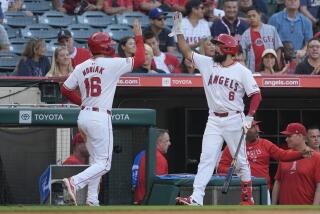Abbott Is Worth Every Penny Angels Are Pinching
- Share via
The Angels spent a lot to bring Jim Abbott back home last July--a hefty package of four minor league prospects, including the Angels’ No. 1 draft choice of 1994 and their best starting pitcher at triple-A Vancouver.
Isn’t it worth $200,000 to protect that investment today?
And that is all the time the Angels have left, by the way.
Today.
Till 9 p.m., Pacific Standard Time.
A few more hours for the team’s management to determine if Abbott II deserves a running time of three full seasons, rather than 9 1/2 weeks, and how that transaction with the Chicago White Sox on July 27 is to be remembered.
The Angels’ trade of the half-decade?
Or the club’s most foolhardy giveaway since, well, when Abbott was shipped away the first time?
This has been Bill Bavasi’s Private Hell Week--beginning with Chuck Finley and Abbott both unsigned and ending, one way or another, in confetti or flames, on Jan. 8, the deadline for free agents to re-enlist with their most recent teams.
Bavasi salvaged at least a split Thursday when he requested and received Finley’s autograph on a three-year contract worth $12 million, plus an option. Bavasi called it a great day in the history of the franchise. Angel fans called it a start.
If Finley is the Angels’ best starting pitcher, Abbott is the most popular. Applause has never won any team a pennant, but popular players do sell tickets, and with the money those tickets bring in, teams are able to sign players capable of winning the pennant.
Abbott is popular, largely, because he wins big games. Those two nine-game losing streaks in September that ultimately dragged the Angels out of first place? Victories by Abbott snapped both of them. His 5-0 shutout of Texas, in Texas, on the last Sunday in September was nothing less than a resurrection of a season. Abbott hadn’t pitched a shutout since 1993--that one was a no-hitter, for the Yankees against Cleveland--but the Angels hadn’t won a game since Sept. 12.
Desperate circumstances call for desperate measures, so Abbott stepped into the The Ballpark in Arlington and pitched The Three-Hitter in the Nick of Time.
Having been shown again how the process works, the Angels won five of their next six games to reclaim a share of first place and force the one-game playoff with Seattle.
Before his trade from Chicago, Abbott led White Sox starting pitchers in earned-run average--3.36.
After his trade from Chicago, Abbott led Angel starting pitchers in earned-run average--4.15.
Overall, Abbott’s earned-run average for 1995 was ninth in the American League--3.70. His total innings pitched--197--were more than anyone else on the Angels’ staff.
Whether Abbott was worth the Angels’ No. 1 draft pick in 1994 (outfielder McKay Christensen), Vancouver’s top starting pitcher (Andrew Lorraine), a promising triple-A reliever (Bill Simas) and double-A starter John Snyder remains to be seen, possibly as soon as 9 o’clock tonight.
The four prospects are long gone. Do the Angels really want to risk losing a fifth player, the most important of the bunch, over what amounts to $200,000--the raise Abbott is seeking for 1996?
Last season, Abbott made $2 million in base salary and another $800,000 in incentives--$2.8 million overall. Abbott’s agent, Scott Boras, says his client will accept a three-year contract worth $9 million. The math is simple. Average salary per year: $3 million.
The Angels are said to be offering around $8 million for three years--and here is where semantics start bogging down the negotiations.
If the Angels’ offer is $2.6 million a season, and Abbott’s base salary was $2 million in 1995, the Angels contend that they are actually giving Abbott a raise of $600,000.
Boras prefers to take Abbott’s base salary plus bonuses as a whole. That works out to $2.8 million, which Boras is quick to point out is more than $2.6 million.
Thus, Boras’ rationale, as of Sunday afternoon: “[The Angels] have no reason, with Jim having the best ERA on the team and the most innings pitched, to cut his salary. So I don’t know what they’re going to do.”
The Angels’ counter-spin: This is all the money we’re permitted to spend until the Disney sale is approved. Our hands are tied.
Boras, however, noted that the Angels committed $12 million to Finley through 1998 and, potentially, another $6 million in 1999 if the club agrees to the option year.
Six million dollars for a pitcher who will be 37 in 1999?
“I always heard there were budgetary issues,” Boras says, “but there aren’t, anymore.”
The Angels say $2.6 million is quite a sum for an 11-8 pitcher who ended the 1995 season as the team’s No. 3 starter behind Finley and Mark Langston.
But Finley is 33; Abbott is 28.
Finley pitched 192 innings in 1995; Abbott pitched seven more.
Finley’s ERA in 1995 was 4.21; Abbott’s was half a run lower.
Finley, according to the Angels, is worth $12 million over the next three years.
But Abbott isn’t worth $9 million?
Think of all the money the Angels could have saved if they hadn’t shelled out four minor leaguers for a bunch of “Class Reunion” buttons last July.
More to Read
Go beyond the scoreboard
Get the latest on L.A.'s teams in the daily Sports Report newsletter.
You may occasionally receive promotional content from the Los Angeles Times.






